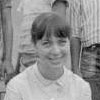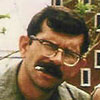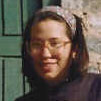Renewable Resources–The Second Generation
[This “A Writer Writes” was published back in the Nineties and is a amusing and touching tale by a ‘second generation’ PCV, Adrienne Benson Scherger (Nepal 1992-94).]
A Writer Writes
Renewable Resources
Growing Up with “Sarge” Shriver’s Biggest Fans
by Adrienne Benson Scherger (Nepal 1992-94)
MY BROTHER IS THE BLACK SHEEP of the family. He married a year out of college and went to law school, which he loved. Soon afterwards he became a lawyer and a father. I admire his rebellious spirit. I, on the other hand, split up with my college boyfriend just before graduation. He went back home to Alaska, and I packed a backpack and headed for the Himalayas to work as a Peace Corps Volunteer in Nepal. I always was the dutiful daughter.
Ever since I can remember, Sargent Shriver’s name has been a household word. Often, one or the other of my parent’s would pause in the middle of a story about their Peace Corps experience and sigh, “Good old Sarge Shriver.” In Zambia when I was a small child, my parents were working for the American Friends Service Committee. Those were the days of little extra money and we used to vacation by taking extended camping trips in our VW van. Driving through the game parks, my

Mom
brother and I would bounce up and down shrieking, “Whoever sees an elephant first gets a brownie!” My mother would turn from her position in the passenger seat to say, “Settle-down, you guys. Let me tell you about the time I lived right by the ocean.” Nothing would calm me like imagining my mother with her long, black braids setting up a home in a bamboo house, a house on stilts at the edge of a Philippine island.
My father, too, would hold us enraptured. He’d pause mid-sentence to twist up the edges of his handlebar mustache and launch into a story of the Rajesthan desert – narrow escapes from deadly asps or trying to teach Hindu camel herders to raise chickens. He even claimed to have learned to hypnotize chickens in Peace Corps training.
My mother and father’s story
My mother, formerly Pamela Cohelan (Philippines 1963-65) and my father, David Benson (India 1963-65) were both Peace Corps Volunteers. They served under Kennedy, under “Good old Sarge Shriver.” They were Volunteers in the days of Peter Pan collars and sing-a-longs to “Michael Row The Boat Ashore.” They were in during the days of Stateside training and de-selection by way of psychological observation and rigorous “survival training.” Growing up with their stories and their commitment to development work, there was never a time when I didn’t dream of joining the Peace Corps myself.
My parents even met one another through the Peace Corps. She closed service and embarked on a round-the-world trip. She was headed home to a job at Peace Corps headquarters in Washington. My father closed service, but stayed on in India and

Dad
took a Peace Corps staff position at the Northern regional office. During her visit to India my mother met some Volunteers, one of whom was my father. The rest is history. They laid eyes on one another and suddenly a job at Peace Corps Washington didn’t seem quite so appealing. My mother found herself a position with the Peace Corps regional office in Calcutta and six weeks (yes, six weeks) after they met they were married in a church in Bombay. He sweating in a dark suit, she wrapped in a crimson sari.
My turn
When I was accepted to Peace Corps almost thirty years later, my parents were thrilled. When they heard I was going to Nepal, they began planning their trip. I had grown up in Africa, so Asia was a welcome new horizon for me and, of course, a cause for nostalgia for them.
Some things about being a second-generation Peace Corps Volunteer were great. My parents understood my angst-filled, sometimes lonely letters home. They could talk about sustainable development and the frustrations of village life. They laughed with me in recognition of generic Peace Corps stories, dangerous pit-latrines and over-crowded busses. My mother and I found solidarity in the classic female Volunteer weight-gain and in the multitude of marriage proposals from strange men (my father’s proposal to her not included).
Other things about having Peace Corps parents were less positive. “We never had packages sent to us,” my parent’s scoffed at my pleadings for magazines and junk food. And there was the time I fell leaving my village and broke my leg in three places and when I called home from Kathmandu, depressed at my limited ability to move, my mother cheerfully chided, “When I broke my leg skiing in college, I went Israeli folk-dancing all night in my walking-cast!” Ten days later she wasn’t quite so upbeat when I called back to mention that not only was I still immobile, but I had also contracted typhoid. Their nickname for me, “Typhoid Mary” has finally faded into family legend.

Me!
As a Volunteer in the nineties, I was often told that things are much easier for contemporary Volunteers then they were back “in the day.” I’m sure that’s true in many ways. However, when my parent’s first made the hike into Pula Bhirmuni, my village under the edge of a cliff in the Kali Gandaki river valley, both said that my site, my Peace Corps life, was harder than theirs. Although I understood that much of that assertion had to do with the fact that I am their baby daughter, I felt, upon hearing it, that I’d arrived.
The visit
My parents stayed in Nepal for a month. Unfortunately it was the monsoon season and many of the classic mountain vistas were obscured by haze. We managed to get our fill however, by flying north from Kathmandu to Jomsom. Flying internally in Nepal is always quite an experience, but the Jomsom run is famous. The town lies on the Tibetan plateau at 12,000 feet. Flying there, in a ten-passenger Cessna, the Annapurna Himalayas suddenly appear. You find yourself looking out the window at a massive wall of black rock and blue-green glaciers. Twisting your neck to look way, way up you see the peaks above you, shining in the thin air. This was at once the most terrifying and exhilarating experience I had in Nepal. My mother, with her unconditional love of mountains, forgot her fear of flying and wept with awe.
I was so proud of my parents during their trip. We landed in Jomsom and trekked north for two days, then turned around and headed south where Pula Bhirmuni lay a week’s walk down the Kali Gandaki valley. We trekked through monsoon rain and heat that drove us to stand, fully clothed, under path-side waterfalls. Miraculously, we avoided leeches. There were other pests though. One memorable night we were awoken by my loudly cursing father – a rat had fallen from the wooden beam above his bed, landed on his head, and scrabbled in his hair before leaping off into the darkness.
We ate bad food, fought off flies, and pined for the out-of-season dessert that made this route the “apple pie trail.” “Things are different during the trekking season in the Fall,” I moaned. My mother was a teacher though, and could only take extended vacation in the summer. So we made do. My father practiced his rusty Hindi on a barefoot Sadhu from India who asked us, “Yeh rastha Muktinath heh?” referring to the ancient Hindu temple way up north in the mountains. My father pointed to path, then pointed north, “Yeh rastha!”
The three days we spent in my village were not the highlight of the trip. The water from the tap nearest my house was diverted to the fields, so we had to carry water for drinking and bathing up stairs and across the narrow paths through the rice paddies from a good distance away. My village brother, Bhim Bahadur, made it his mission to convince my father to “use his good connections” to get Bhim a visa to the United States. My assurance that my father had no such connections made little difference. During dinner each night that we were there, Bhim plied my father with homemade rice “wine” and launched into his pleadings. My father would nod along, saying how much he and my mother were enjoying their time in Nepal, and how beautiful the village was. Playing ignorant to avoid confrontation and save face was another skill my dad learned in Peace Corps.
The women in the village were so impressed that I had a family. Many hadn’t been convinced that I was not simply some unconnected entity here because I had nowhere else – a young, unmarried woman voluntarily so far away from her family was too bizarre to imagine. My mother wore a salwar chemise (a long tunic with baggy pants), which was a huge success. We spent a day down in the rice paddies with the women. The tiny, terraced fields were emerald with the new rice growth and were bordered with golden, blooming soybeans. Amongst the laughter and singing of the women we tried our best to work the rice. The women shrieked with mirth, “Aasa!” they screamed my village name, “your mother can do this better than you can!”
When my parents left Nepal they left, as they said, more worried about me than they had been before they saw my situation. This had less to do with my village, than with the dilapidated, brake-less trucks I caught to take me from road-head down the mountain road – the breathtakingly steep cliffs inches away from the wheels, with no wall to hold errant vehicles back. However, I should add that their alleged increased worry had no effect on the number of packages they sent.
From Nepal they continued on to India, where they visited my father’s old Peace Corps site. Thirty years after his service had ended they were given a wonderful reception. Everyone still remembered him and his chicken projects.
I hope that there are some people in Pula Bhirmuni who remember me when I go back in thirty years. I have two children of my own now who I hope someday will clamor to hear my Peace Corps stories. Maybe they will be third generation Peace Corps Volunteers, children raised on images of their mother making a home for herself in a little stone house in the shadow of the mountains in Nepal.
Adrienne Benson Scherger was raised in Zambia, Liberia, and Kenya and joined the Peace Corps after graduating college, working as an English teacher and teacher trainer in Nepal. Later, she worked at Peace Corps/Washington as a Desk Assistant in the Africa region. At the time she wrote this essay she lived in Tirana, Albania where her husband (Romania, 1996-97) the Administrative Officer for Peace Corps/Albania. They have two sons, Miles and Finn.
What a great story. I was a PCV in the Philippines (64-66) and married Larry Foley, a PCV in India working with chickens (65-66) when we were in graduate school in San Francisco. Sounds like your parents never lost their spirit of adventure. It was easy for me to identify with your story. Good job.
In spite of just what numerous may consider, minecraft gratuit is well known all over countless countries all over the world.
minecraft gratuit but has existed for a number of ages and contains a vital that means inside lifestyles of countless.
It could be secure in order to suppose that will minecraft gratuit are going to be about for a
long time and possess a large impact on this life of countless people.
minecraft gratuit has a huge position with National Way of life.
Some people can often be viewed taking part in things to do regarding minecraft gratuit.
It is partially since men and women of most
age groups could be concerned as well as family members are
usually introduced together by this. Generally an individual who
displays their don’t like pertaining to minecraft gratuit could be thought to be an outcast.